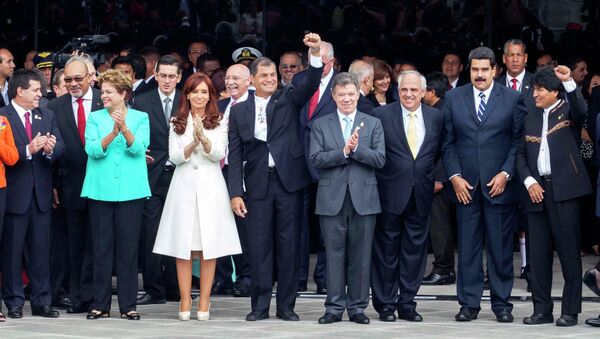MOSCOW, December 6 (Sputnik) — The Union of South American Nations (UNASUR) summit, a two day inter-government meeting on regional economic and political integration, concluded on Friday, with the concept of “South American citizenship” possibly its most exciting proposal.
Ernesto Samper, UNASUR’s Secretary General, noted that the organization has agreed upon the idea of a “South American Passport”, which would facilitate the free movement of people in the region for work or study across the continent, similar to the European Schengen zone. The concept supports the mutual recognition of degrees from the respective countries’ universities and other institutions of higher learning.
Guarantees on “the freedom of movement of 400 million South Americans in the region, the right to work, the validation of university degrees and legal protections is my dream”, Samper said, according to the Buenos Aires Herald. He added, “I want to arrive at an airport and hear ‘South American citizens only at this window’.” Samper noted that the concept of the South American passport may be the “most important achievement of this summit.”
The summit, which was held Thursday and Friday in the Ecuadorian cities of Guayaquil and Quito, concluded with the inauguration of the intergovernmental organization’s new 20,000 square meter headquarters in Quito. The headquarters was dedicated to the late former Argentinian President Nestor Kirchner, the first Secretary General of the organization.
At the unveiling of the headquarters, Ecuadorian President Rafael Correa noted that “here the spirit and hope of 400 million South Americans will be housed.” He explained the tremendous potential of the organization, noting that “in UNASUR, we are 400 million, 400 thousand people [with a territory of] 17 million square kilometers. By uniting, we could [become] the 4th largest economy in the world, with 6 percent of [its] gross domestic product.” He explained that South America has “a third of the world's fresh water, [is] first in food production, and [has] hydrocarbon reserves for the next 100 years,” according to Telesur. “Now is the time, this is the commitment we have to history that we must meet, we do not have the right to fail,” Correa added.
Correa expressed his support for the advancements of proposals including the Bank of the South, a long-held ambition in the region aimed at fostering regional economic development independently of economic and political influence of the World Bank and the International Monetary Fund. He also proposed a regional currency exchange system aimed at minimizing the use of the US dollar, the development of a regional currency “in the medium term,” and the idea of a South American court of arbitration.
Secretary General Samper, the former President of Colombia, noted that the bloc’s priorities included the defense of human rights, social justice, and the deepening of democracy, including the strengthening of a regional electoral monitoring system. Venezuelan President Nicolas Maduro echoed Samper’s words, adding that the bloc must work to develop strategies to promote continental economic development, proposing a Bank of Structural Projects, as well as defense sovereignty. According to La Prensita, Maduro noted that a “new South American military doctrine” is necessary, which would be based on a “system of education for the South American military, under the guidance of the South American Defense Council,” which would be based in Ecuador.
Chilean President Michelle Bachelet noted that the present is “a very favorable time to continue collectively advancing in search of common solutions to the main political economic, social and environmental challenges” facing the region, the Latin American Herald Tribune noted.
Argentinian Cristina Fernandez de Kirchner, speaking at the opening ceremony of the new headquarters in Quito, was quoted by the Buenos Aires Herald as saying that “we [South Americans] managed to overcome our difficulties through unity. UNASUR has been of fundamental importance, recently, in avoiding a coup in Bolivia, and another in Ecuador. It also served to resolve, once and for all, the differences between Venezuela and Colombia.”
Uruguayan president Jose Mujica, according to Venezuelanalysis.com, noted that optimism must be combined with determination to move forward, stating that “there won’t be integration without commitment, willpower, and political will, because the global obstacles are enormous and the past continues to constrain us.”
Russia Interested in Strengthening of UNASUR
Russian officials, including Alexander Shchetinin, the director of the Latin American Department of the Russian Foreign Ministry, were invited to attend the summit. He told the Russian language service of the TASS information agency that Russia “fully supports the process of integration in Latin America, and [is] interested in it being a politically and economically viable organization.” The official added that “we are ready to develop relations with this bloc to the full extent that the countries which participate in it are ready to establish links with extra-regional countries, including Russia,” adding that Russia’s invitation to the summit “reflects the interest of UNASUR in establishing such cooperation.”
Earlier, Yan Burlyai, Russia’s ambassador to Ecuador, had explained that Russia’s interests coincide with those of UNASUR in the development of a politically and economically multipolar world, and noted the tremendous potential for Russian technical and trade cooperation with the supranational bloc.
The UNASUR bloc, which was officially established in 2011 following a 2008 treaty, is an intergovernmental union aimed at the regional economic, political and defense integration of South America. It comprises 12 countries, including the four members of the Andean Community of Nations, Bolivia, Colombia, Ecuador and Peru; the members of Mercosur, Argentina, Brazil, Paraguay, Uruguay and Venezuela; as well as Chile, Guyana and Suriname, with Mexico and Panama as observers.


